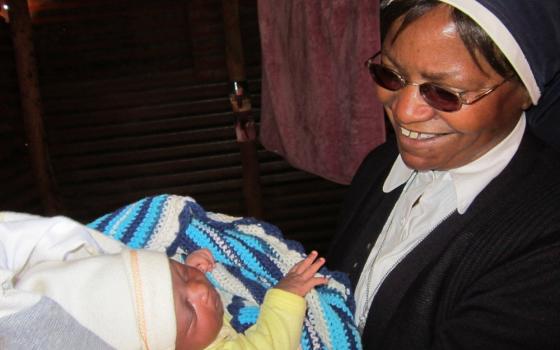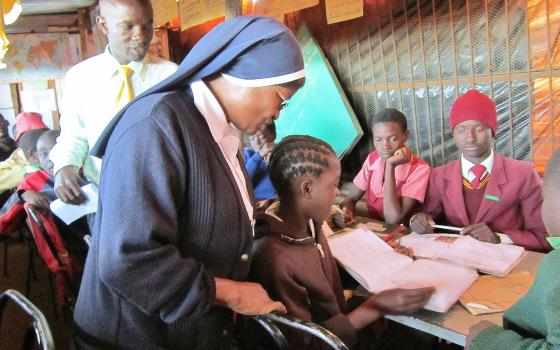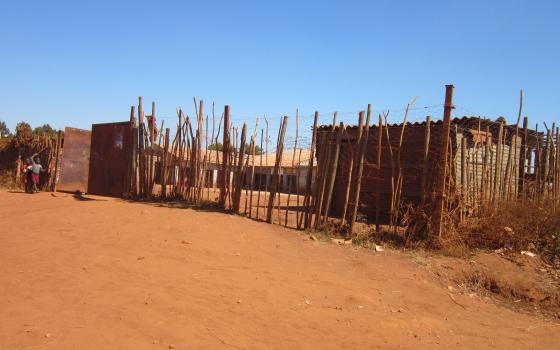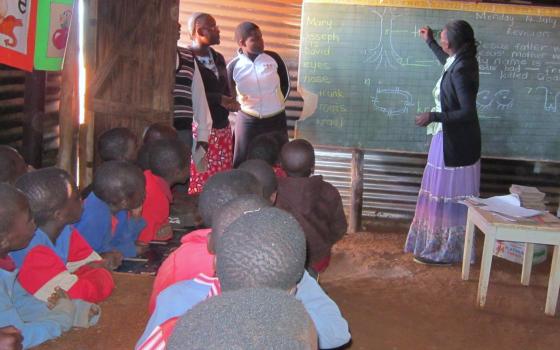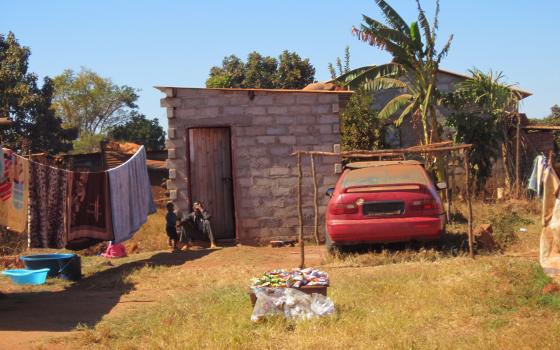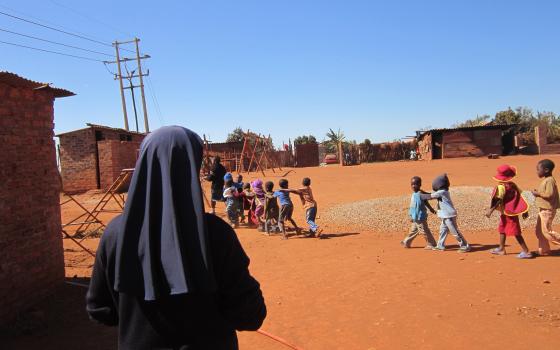Sr. Irene Holland steered her Isuzu between the deep ruts and potholes on the track leading to Hatcliffe Extension squatter camp a few miles north of Harare, where 20,000 unemployed Zimbabweans live in plastic shacks.
We were on our way to visit Tichakunda, an early child development center whose name means “we shall overcome.” Winnie Masaraure, 54, a grandmother whose home had been razed repeatedly during slum clearances, opened it in 2005 to serve double orphans (children who have lost all parents and grandparents).
Holland, a Sister of Nazareth, is visibly moved by the devastation she sees every week when she visits the dust bowl that is Tichakunda.
“As women religious we earn nothing – but we do eat, unlike these poor people.”
She points to an 8-foot by 8-foot concrete shack with only a door. “That’s a garikai house built by the government. Whole families live in there.”
“Garikai” means “to live well,” but the name falls short of the reality.
Holland has saved people in worse situations, notably Tinaye, 9, who had cerebral palsy and was living in a shack in the squatter’s camp built of black plastic bags. “She was unconscious when I found her, her toes eaten by rats.”
Holland was looking for a place that could help children like Tinaye when she discovered Masaraure’s center, run from a series of corrugated iron sheds without any support. “I had to help,” she said.
Her role has been to introduce people and potential donors to Tichakunda. “I approached my congregation, and to my surprise, our leadership bought the land where Tichakunda now stands ‘for the community of Hatcliffe.’”
The community grew after Operation Murambatsvina (clean-up), the government’s clean-up campaign of 2005 that displaced thousands of people living on the margins of society.
She has revolutionized the center, which now comprises a primary and secondary school, as well as the original early child development center for children under five, where 540 children receive a hot lunch every day.
“I haven’t been able to help as much as I would like,” she said, having been diagnosed with breast cancer earlier this year. “We have to keep going: there is no time to stand still in God’s vineyard.”
Holland entered religious life 36 years ago and loves working with both the young and aged.
She believes, “It’s impossible to save the world from poverty, but it is possible to save one life in the eyes of love and a heart and hand of compassion.”
As a child who regularly attended Mass, Holland was impressed by the work of the religious and began to contemplate giving her own life to God. After visiting many congregations in search of her vocation, it was on a visit with the Junior League of Mary that Holland met the Sisters of Nazareth and realized that it was with this community that she wanted to “walk in Christ's footsteps.”
She entered the community on February 2, 1978, and went to Nazareth House in Hammersmith, London, for her novitiate. For the next 29 years Holland worked with the elderly in England, returning first to South Africa in 2005 where she worked with vulnerable babies infected with HIV/AIDS before coming home to Zimbabwe in 2007.
At Nazareth House in Harare she has many responsibilities. Besides her involvement with orphans, under-privileged children and the destitute elderly, her main concern is with young people seeking to consecrate themselves to the church. Her title is postulant director.
In six years Holland has initiated 10 Zimbabwe candidates into religious life. She likens the process during the years of discernment, before taking final vows, to the effect a fast-flowing river has upon stones, constantly rubbing them up against each other. Some stones will crack or break, while others emerge smooth, spherical and beautiful.
“Zimbabwe has become the cradle for vocations,” said Holland. It is not as easy as it used to be because the Muslims offer their converts food and the Catholics do not.
“We are a donor-dependent society, and people say, ‘Why should we join you when these other people feed us?’”
Travelling countrywide to give workshops, she has inspired girls from as far afield as Victoria Falls. Accompanying us to Tichakunda were two young women from Hwange, the coal-mining town in the north west of Zimbabwe.
Both girls were shocked by the disparity between the destitute and the very rich in Harare’s suburbs.
Holland asked, “Thirty-two rooms in that house! For one family! What do they do in all of them?” as she drove the girls through upmarket areas on their way to the squatter camp.
Trained as a nurse and a social worker, Holland has all the skills to attend to the many calls for help she receives daily.
“I must touch someone's life every day,” she said, making sure both mobile phones were switched on.
[Zimbabwean-born Diana Rodrigues is a freelance writer with a wide range of interests including art, cookery, literature and religion. She has a BA (Hons) London degree in English and a Postgraduate Certificate in Education from Bristol University, England.]
